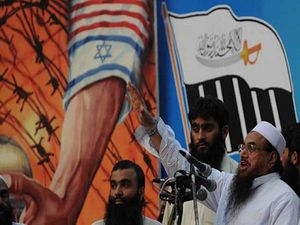A number of reports have surfaced recently claiming that Hafiz Saeed, the chief of the Jamaat-ud-Dawa (JuD), a proscribed organization that primarily targets Indian interests, has decided to register a political party in Pakistan. Reportedly, the party is being registered under the name of Mlli Muslim League Pakistan.
Although JuD’s chief remains under house arrest, his organization essentially remains active without any hindrance or resistance from the state. JuD runs a number of social and development programs all across Pakistan. Arguably, Saeed’s detention was carried out to show that Pakistan was ready to accommodate U.S. President Donald Trump’s demands on a number of security issues. While commenting on the Saeed arrest about six months ago, the military in Pakistan said that the decision to keep him under house arrest was “a policy decision that the state took in [the] national interest.”
However, the crucial question that begs attention is why Saeed is interested in forming a political party now. Does the likely transition from a jihadist organization to a political party mean that Pakistan has changed its policy of using Saeed’s organization to settle scores with India?
Certainly, there has been a change in Pakistan’s strategic approach in dealing with this group, but this change is borne of domestic considerations rather than external ones. Saeed’s participation in Pakistani politics points toward the state’s efforts to contain the JuD’s jihadist agenda and its domestic implications by offering it another outlet for its energies; this is seen as the only way forward to deal with the group.
While it remains unclear whether Pakistan intends to terminate the use of JuD and Lashkar-e-Taiba as a foreign policy tool, domestically, Pakistan’s limitations have been evident when it comes to dealing with jihadist groups like JuD that enjoy mass public support. Moreover, these limitations also extend to the state’s inability to counter their violent narratives; for the past three decades, the country’s policies have only enabled, encouraged, and mainstreamed such practices. Particularly in Punjab, which is a melting port of different jihadist groups, the limitations related to the state’s counterterrorism efforts are palpable. Accordingly, accommodation rather than action has been devised as the core policy approach.
There are other examples from Punjab, where the state’s attempt to co-opt sectarian jihadists into the country’s political fold appear obvious. The recent election of Masroor Nawaz Jhangvi, son of Sipah-e-Sahaba Pakistan (SSP) founder Haq Nawaz Jhangvi, to the Punjab assembly not only highlights the state’s new approach to these groups, but also the limitations of this approach.
None of this is without risks for Pakistan.
While the state may be trying to bring jihadi outfits into the mainstream, there appears to have been no effort to challenge the prevalent jihadist narrative in the country. In the absence of an effective counter violent extremism (CVE) approach, one can only wonder what the likes of Saeed and Jhangvi can bring to the mainstream political fold. If Saeed was able to gain some electoral foothold in Punjab, which appears unlikely, it would only further enhance his ideological support base. The state, by allowing Saeed to grow politically, may not only further entrench militant Islamism in Pakistan, but further deepen the country’s counterterrorism challenges internally.
There are other factors at play too, which are tied with JuD’s apparent transition. The change in policy regarding Saeed’s role in Pakistan’s domestic politics also deals with the state’s intention to legitimize the group’s banding by portraying it as more moderate. Currently, Pakistan political landscape is reeling with controversies and scandals, which offer the country’s security establishment an ideal setting to introduce JuD into the country’s political arena. Doing so only broadens the military’s own domestic political support base.
Meanwhile, the civilian government’s sluggish response in dealing with Saeed’s organization stems from the former’s limited control over the country’s security policy. Even if Pakistan’s political leadership is convinced that a strategic response is necessary against Saeed’s brand of extremism, they simply cannot do so without risking their own survival and control over power.
A section of Pakistan’s security establishment still views Saeed and his associates as a useful tool in some measures, particularly vis-à-vis India. Moreover, Saeed and a number of other anti-India jihadist groups offer legitimacy and street power to Pakistan’s confrontational policy toward New Dehli. In this context, the impending transition of the JuD from a proscribed organization to a political party is hardly a result of international pressure.
What is troubling in the end is that the state is not interested in taking any action against the violent narrative that forms the basis of a number of Pakistan’s jihadist groups, including JuD. This is primarily Pakistan’s biggest counterterrorism challenge and one that the state continues to overlook.

































